Individual Essay: Globalization's Influence on HRD - BUSM1139
VerifiedAdded on 2022/08/12
|8
|2151
|20
Essay
AI Summary
This essay examines the multifaceted impact of globalization on Human Resource Development (HRD). It begins by defining globalization and highlighting its significant influence on modern organizations, particularly multinational corporations (MNCs). The essay delves into the challenges posed by globalization, such as managing a diverse workforce, adapting to different cultural contexts, and navigating varying legal and ethical considerations. It also explores the opportunities that globalization presents for HRD, including access to a wider talent pool and enhanced career development prospects. The essay provides recommendations for HRD professionals, emphasizing the importance of proactive strategies, continuous learning, and a focus on employee motivation. The essay concludes by underscoring the dynamic and proactive role of HRD in aligning employee skills with organizational objectives to achieve success in a globalized business environment. The essay also references and analyzes relevant research papers and studies to support its claims and arguments.

Running head: HUMAN RESOURCE DEVELOPMENT
Human Resource Development
Name of the Student:
Name of the University:
Author Note:
Human Resource Development
Name of the Student:
Name of the University:
Author Note:
Paraphrase This Document
Need a fresh take? Get an instant paraphrase of this document with our AI Paraphraser

1HUMAN RESOURCE DEVELOPMENT
Human Resource Development has become an indisputable organ of any organization
(Wang et al. 2018). Though SMEs have not properly developed the HRD organ to their
organization, MNCs use this as one of their most important arm. The practices of HRD has
changes significantly in the last few decades and the main reasons behind that is the impact of
globalization. Globalization can be defined as the phenomenon that has created a world-wide
interdependence of economy, culture trade and population. This has made the world a large
market (Gunawan, Kurnia & Ghazali 2019). Thus, the impact, challenges and opportunities
that this phenomenon has presented to the HRD professionals needs to be analyzed. This
paper explores the impacts of globalization and the challenges it brings with it. Moreover, it
analyzes the opportunities presented by globalization.
Globalization brings with it the trend and need of expansion to new territory. Most of
the Multinational Corporations are setting up new offices in locations all over the world. This
impacts the human resource development in many ways. The greatest impact falls on the
management and development of the workforce (Walter & Förster 2019). Workforce is the
greatest concern of the human resource development and the focus of the HRD is to acquire,
manage and retain as many employees as possible. When a company becomes global their
workforce needs changes. They need to train and prepare existing employees to work in the
new locations, they need to acquire local new employees who are both trained and untrained
and they need to develop those employees to the desired performance level and manage all
the tax, travelling and payment related issues. All these aspects are making the work of HRD
much more complicated (Syed & Metcalfe 2017). Managing the relocation requires training
and support and new employees mean introduction of new culture that forces change in the
organization.
Globalization brings with it the need of developing a cross cultural organization. The
global organizations need to consider the differences between high context and low context
Human Resource Development has become an indisputable organ of any organization
(Wang et al. 2018). Though SMEs have not properly developed the HRD organ to their
organization, MNCs use this as one of their most important arm. The practices of HRD has
changes significantly in the last few decades and the main reasons behind that is the impact of
globalization. Globalization can be defined as the phenomenon that has created a world-wide
interdependence of economy, culture trade and population. This has made the world a large
market (Gunawan, Kurnia & Ghazali 2019). Thus, the impact, challenges and opportunities
that this phenomenon has presented to the HRD professionals needs to be analyzed. This
paper explores the impacts of globalization and the challenges it brings with it. Moreover, it
analyzes the opportunities presented by globalization.
Globalization brings with it the trend and need of expansion to new territory. Most of
the Multinational Corporations are setting up new offices in locations all over the world. This
impacts the human resource development in many ways. The greatest impact falls on the
management and development of the workforce (Walter & Förster 2019). Workforce is the
greatest concern of the human resource development and the focus of the HRD is to acquire,
manage and retain as many employees as possible. When a company becomes global their
workforce needs changes. They need to train and prepare existing employees to work in the
new locations, they need to acquire local new employees who are both trained and untrained
and they need to develop those employees to the desired performance level and manage all
the tax, travelling and payment related issues. All these aspects are making the work of HRD
much more complicated (Syed & Metcalfe 2017). Managing the relocation requires training
and support and new employees mean introduction of new culture that forces change in the
organization.
Globalization brings with it the need of developing a cross cultural organization. The
global organizations need to consider the differences between high context and low context
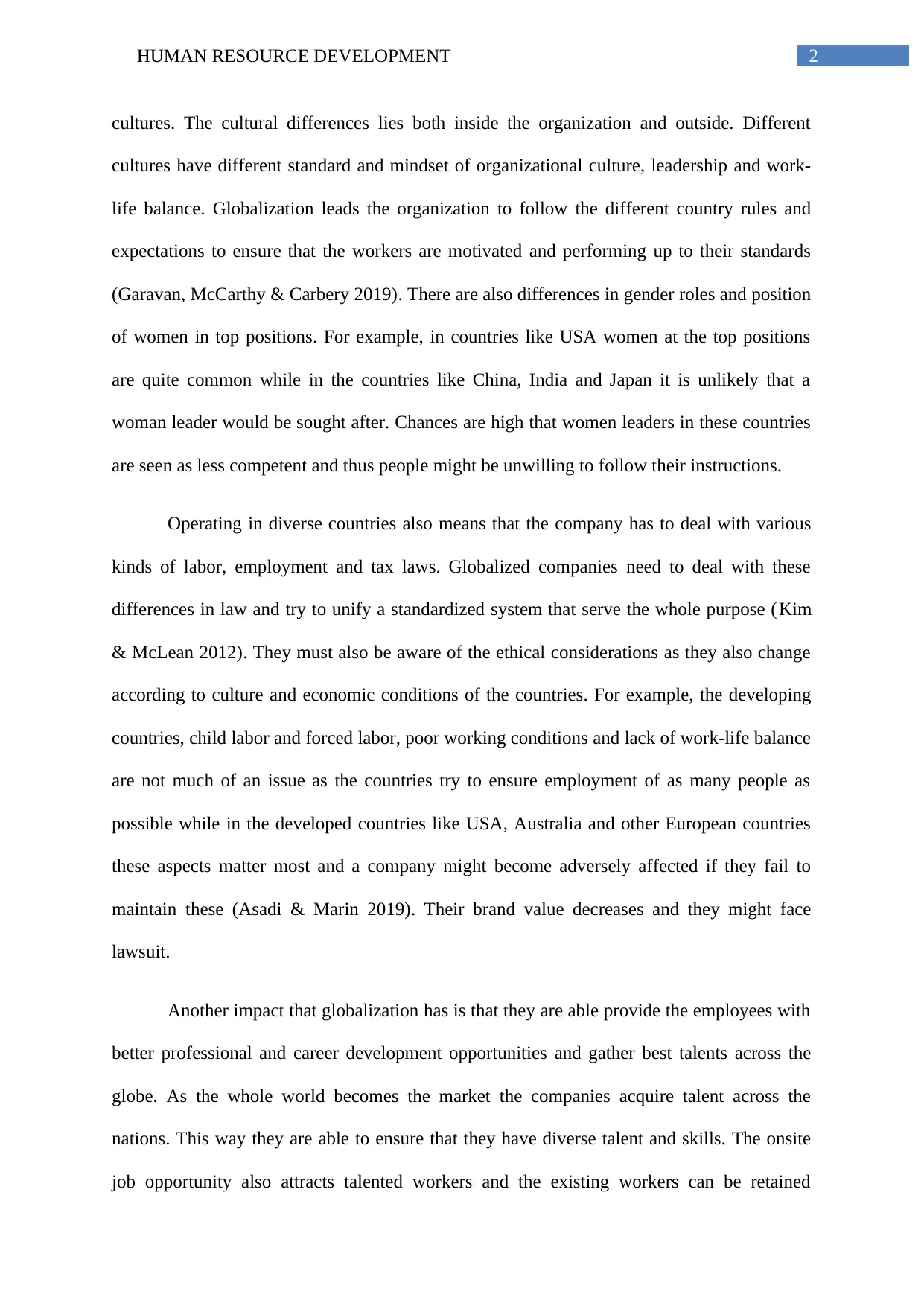
2HUMAN RESOURCE DEVELOPMENT
cultures. The cultural differences lies both inside the organization and outside. Different
cultures have different standard and mindset of organizational culture, leadership and work-
life balance. Globalization leads the organization to follow the different country rules and
expectations to ensure that the workers are motivated and performing up to their standards
(Garavan, McCarthy & Carbery 2019). There are also differences in gender roles and position
of women in top positions. For example, in countries like USA women at the top positions
are quite common while in the countries like China, India and Japan it is unlikely that a
woman leader would be sought after. Chances are high that women leaders in these countries
are seen as less competent and thus people might be unwilling to follow their instructions.
Operating in diverse countries also means that the company has to deal with various
kinds of labor, employment and tax laws. Globalized companies need to deal with these
differences in law and try to unify a standardized system that serve the whole purpose (Kim
& McLean 2012). They must also be aware of the ethical considerations as they also change
according to culture and economic conditions of the countries. For example, the developing
countries, child labor and forced labor, poor working conditions and lack of work-life balance
are not much of an issue as the countries try to ensure employment of as many people as
possible while in the developed countries like USA, Australia and other European countries
these aspects matter most and a company might become adversely affected if they fail to
maintain these (Asadi & Marin 2019). Their brand value decreases and they might face
lawsuit.
Another impact that globalization has is that they are able provide the employees with
better professional and career development opportunities and gather best talents across the
globe. As the whole world becomes the market the companies acquire talent across the
nations. This way they are able to ensure that they have diverse talent and skills. The onsite
job opportunity also attracts talented workers and the existing workers can be retained
cultures. The cultural differences lies both inside the organization and outside. Different
cultures have different standard and mindset of organizational culture, leadership and work-
life balance. Globalization leads the organization to follow the different country rules and
expectations to ensure that the workers are motivated and performing up to their standards
(Garavan, McCarthy & Carbery 2019). There are also differences in gender roles and position
of women in top positions. For example, in countries like USA women at the top positions
are quite common while in the countries like China, India and Japan it is unlikely that a
woman leader would be sought after. Chances are high that women leaders in these countries
are seen as less competent and thus people might be unwilling to follow their instructions.
Operating in diverse countries also means that the company has to deal with various
kinds of labor, employment and tax laws. Globalized companies need to deal with these
differences in law and try to unify a standardized system that serve the whole purpose (Kim
& McLean 2012). They must also be aware of the ethical considerations as they also change
according to culture and economic conditions of the countries. For example, the developing
countries, child labor and forced labor, poor working conditions and lack of work-life balance
are not much of an issue as the countries try to ensure employment of as many people as
possible while in the developed countries like USA, Australia and other European countries
these aspects matter most and a company might become adversely affected if they fail to
maintain these (Asadi & Marin 2019). Their brand value decreases and they might face
lawsuit.
Another impact that globalization has is that they are able provide the employees with
better professional and career development opportunities and gather best talents across the
globe. As the whole world becomes the market the companies acquire talent across the
nations. This way they are able to ensure that they have diverse talent and skills. The onsite
job opportunity also attracts talented workers and the existing workers can be retained
⊘ This is a preview!⊘
Do you want full access?
Subscribe today to unlock all pages.

Trusted by 1+ million students worldwide
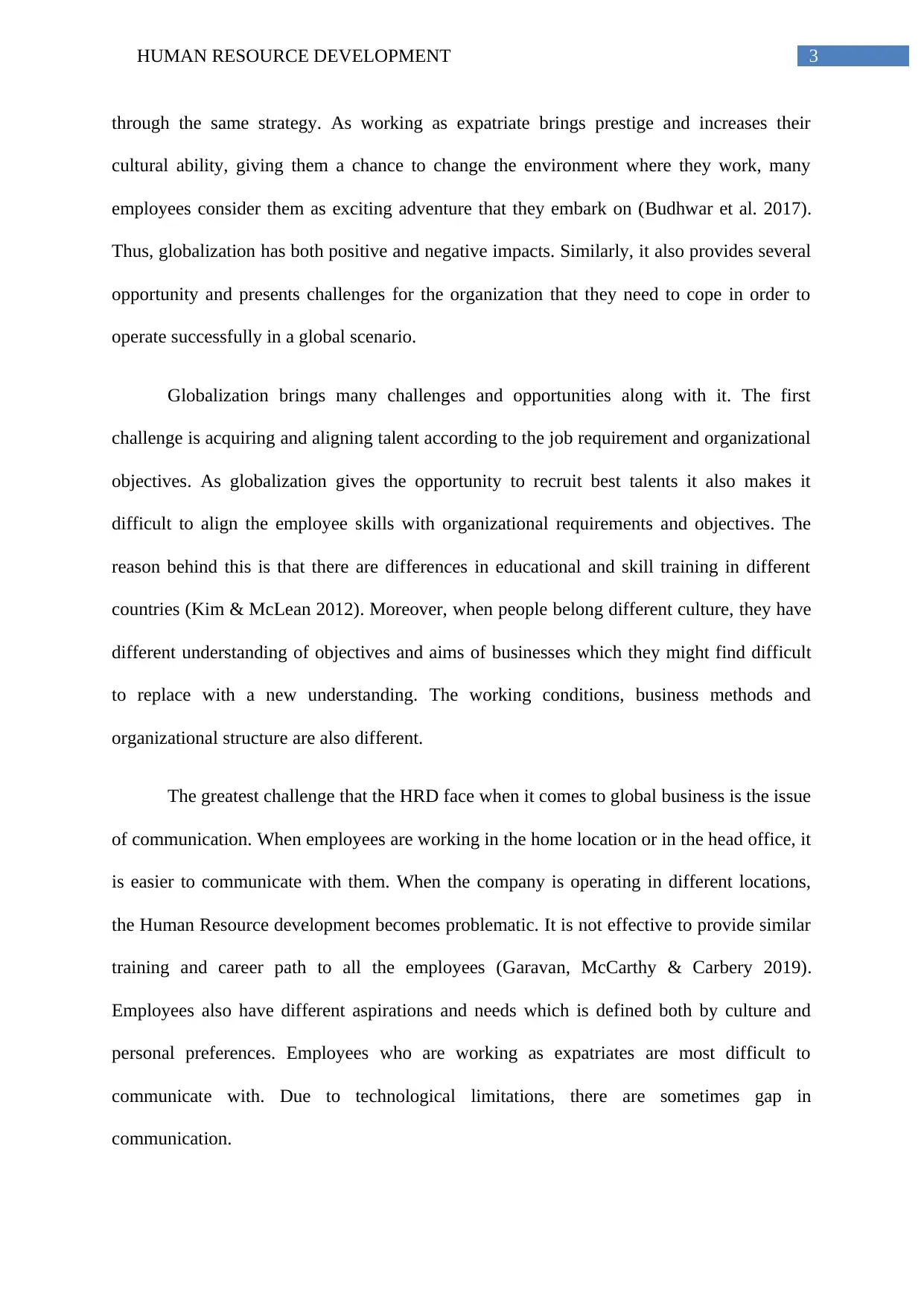
3HUMAN RESOURCE DEVELOPMENT
through the same strategy. As working as expatriate brings prestige and increases their
cultural ability, giving them a chance to change the environment where they work, many
employees consider them as exciting adventure that they embark on (Budhwar et al. 2017).
Thus, globalization has both positive and negative impacts. Similarly, it also provides several
opportunity and presents challenges for the organization that they need to cope in order to
operate successfully in a global scenario.
Globalization brings many challenges and opportunities along with it. The first
challenge is acquiring and aligning talent according to the job requirement and organizational
objectives. As globalization gives the opportunity to recruit best talents it also makes it
difficult to align the employee skills with organizational requirements and objectives. The
reason behind this is that there are differences in educational and skill training in different
countries (Kim & McLean 2012). Moreover, when people belong different culture, they have
different understanding of objectives and aims of businesses which they might find difficult
to replace with a new understanding. The working conditions, business methods and
organizational structure are also different.
The greatest challenge that the HRD face when it comes to global business is the issue
of communication. When employees are working in the home location or in the head office, it
is easier to communicate with them. When the company is operating in different locations,
the Human Resource development becomes problematic. It is not effective to provide similar
training and career path to all the employees (Garavan, McCarthy & Carbery 2019).
Employees also have different aspirations and needs which is defined both by culture and
personal preferences. Employees who are working as expatriates are most difficult to
communicate with. Due to technological limitations, there are sometimes gap in
communication.
through the same strategy. As working as expatriate brings prestige and increases their
cultural ability, giving them a chance to change the environment where they work, many
employees consider them as exciting adventure that they embark on (Budhwar et al. 2017).
Thus, globalization has both positive and negative impacts. Similarly, it also provides several
opportunity and presents challenges for the organization that they need to cope in order to
operate successfully in a global scenario.
Globalization brings many challenges and opportunities along with it. The first
challenge is acquiring and aligning talent according to the job requirement and organizational
objectives. As globalization gives the opportunity to recruit best talents it also makes it
difficult to align the employee skills with organizational requirements and objectives. The
reason behind this is that there are differences in educational and skill training in different
countries (Kim & McLean 2012). Moreover, when people belong different culture, they have
different understanding of objectives and aims of businesses which they might find difficult
to replace with a new understanding. The working conditions, business methods and
organizational structure are also different.
The greatest challenge that the HRD face when it comes to global business is the issue
of communication. When employees are working in the home location or in the head office, it
is easier to communicate with them. When the company is operating in different locations,
the Human Resource development becomes problematic. It is not effective to provide similar
training and career path to all the employees (Garavan, McCarthy & Carbery 2019).
Employees also have different aspirations and needs which is defined both by culture and
personal preferences. Employees who are working as expatriates are most difficult to
communicate with. Due to technological limitations, there are sometimes gap in
communication.
Paraphrase This Document
Need a fresh take? Get an instant paraphrase of this document with our AI Paraphraser

4HUMAN RESOURCE DEVELOPMENT
Globalization has brought with it technological advancements that has created greatest
opportunity for Human Resource Development. Due to technological advancements have
enabled the department to become more autonomous and efficient. The human resource
developments now use chat rooms, video conferencing, and virtual teams to ensure that all
the locations are provided with the best possible talents (Garavan, McCarthy & Morley
2016). They use social media, online recruitment portals and video interviews to recruit
employees. They also use similar technologies for the development of the employees’
personal and professional ability. Technological advancements also provide the opportunity
to understand the requirements of employees across country borders and align them with
organizational strategic goals.
Another opportunity that globalization brings for HRD professionals is that the
demand for GRD professionals have increased exponentially all over the world (Budhwar et
al. 2017). Earlier, many of the counties did not have any HRD planning neither did they have
any human resource management department. This has changed significantly and thus, HRD
professionals are required everywhere. Their job is considered to be of utmost importance as
the success of an organization is believed to be based on the people that are working for them
(Ghosh 2019). The ability of the HRD professionals to acquire talents, manage them, develop
them and retain them decides whether the organization will be able to deliver their projects in
time.
The challenges and opportunities as presented in the paper gives way to some
recommendations that the HRD professionals could follow to become more successful in
career. As people’s person they should always consider people as the greatest investment and
asset for the company. Their job role does not only include looking at the interest of the
company but mainly to ensure that the workforce that is working for the organization is
happy, motivated and high performance (Gunawan, Kurnia & Ghazali 2019). They should
Globalization has brought with it technological advancements that has created greatest
opportunity for Human Resource Development. Due to technological advancements have
enabled the department to become more autonomous and efficient. The human resource
developments now use chat rooms, video conferencing, and virtual teams to ensure that all
the locations are provided with the best possible talents (Garavan, McCarthy & Morley
2016). They use social media, online recruitment portals and video interviews to recruit
employees. They also use similar technologies for the development of the employees’
personal and professional ability. Technological advancements also provide the opportunity
to understand the requirements of employees across country borders and align them with
organizational strategic goals.
Another opportunity that globalization brings for HRD professionals is that the
demand for GRD professionals have increased exponentially all over the world (Budhwar et
al. 2017). Earlier, many of the counties did not have any HRD planning neither did they have
any human resource management department. This has changed significantly and thus, HRD
professionals are required everywhere. Their job is considered to be of utmost importance as
the success of an organization is believed to be based on the people that are working for them
(Ghosh 2019). The ability of the HRD professionals to acquire talents, manage them, develop
them and retain them decides whether the organization will be able to deliver their projects in
time.
The challenges and opportunities as presented in the paper gives way to some
recommendations that the HRD professionals could follow to become more successful in
career. As people’s person they should always consider people as the greatest investment and
asset for the company. Their job role does not only include looking at the interest of the
company but mainly to ensure that the workforce that is working for the organization is
happy, motivated and high performance (Gunawan, Kurnia & Ghazali 2019). They should
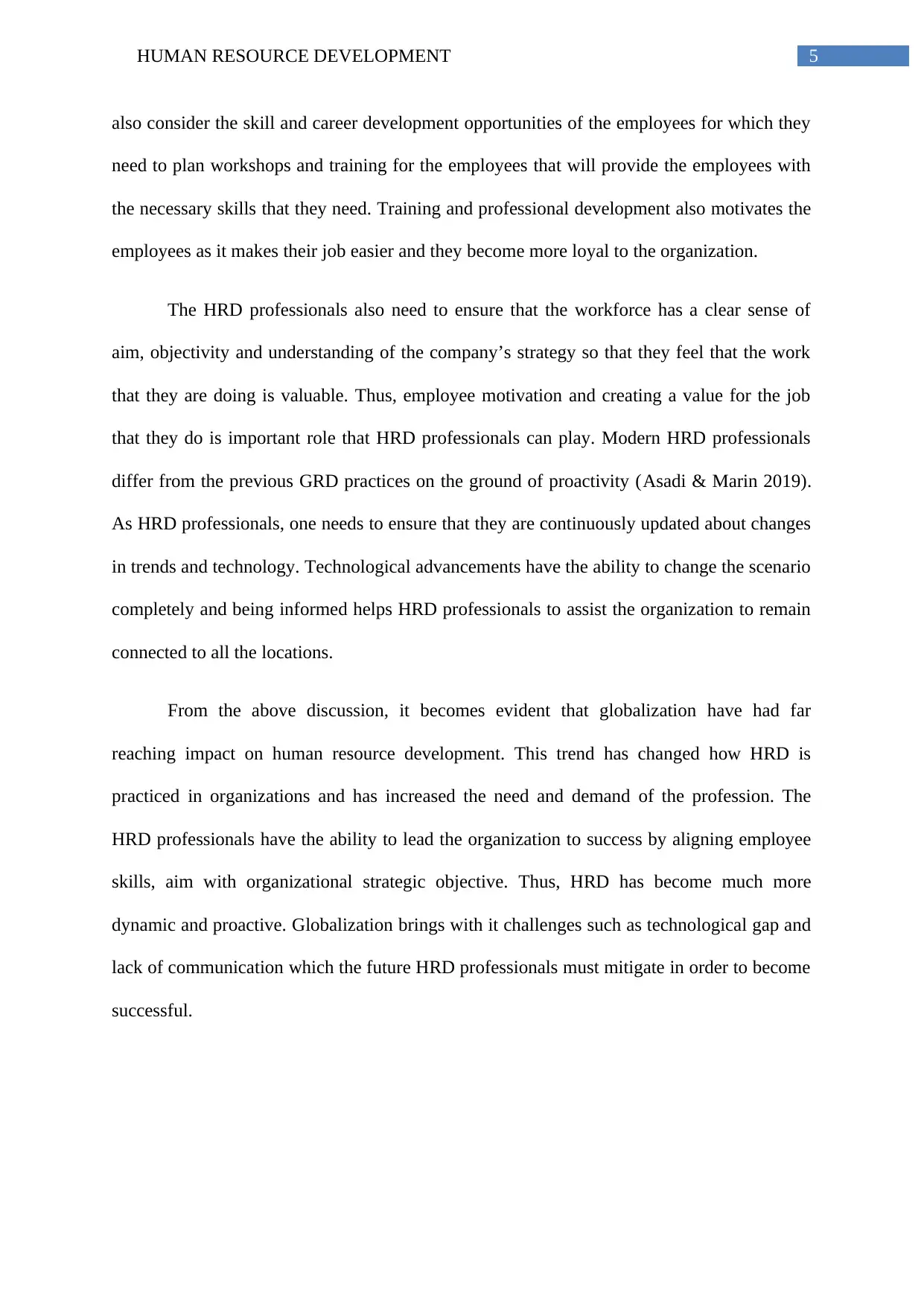
5HUMAN RESOURCE DEVELOPMENT
also consider the skill and career development opportunities of the employees for which they
need to plan workshops and training for the employees that will provide the employees with
the necessary skills that they need. Training and professional development also motivates the
employees as it makes their job easier and they become more loyal to the organization.
The HRD professionals also need to ensure that the workforce has a clear sense of
aim, objectivity and understanding of the company’s strategy so that they feel that the work
that they are doing is valuable. Thus, employee motivation and creating a value for the job
that they do is important role that HRD professionals can play. Modern HRD professionals
differ from the previous GRD practices on the ground of proactivity (Asadi & Marin 2019).
As HRD professionals, one needs to ensure that they are continuously updated about changes
in trends and technology. Technological advancements have the ability to change the scenario
completely and being informed helps HRD professionals to assist the organization to remain
connected to all the locations.
From the above discussion, it becomes evident that globalization have had far
reaching impact on human resource development. This trend has changed how HRD is
practiced in organizations and has increased the need and demand of the profession. The
HRD professionals have the ability to lead the organization to success by aligning employee
skills, aim with organizational strategic objective. Thus, HRD has become much more
dynamic and proactive. Globalization brings with it challenges such as technological gap and
lack of communication which the future HRD professionals must mitigate in order to become
successful.
also consider the skill and career development opportunities of the employees for which they
need to plan workshops and training for the employees that will provide the employees with
the necessary skills that they need. Training and professional development also motivates the
employees as it makes their job easier and they become more loyal to the organization.
The HRD professionals also need to ensure that the workforce has a clear sense of
aim, objectivity and understanding of the company’s strategy so that they feel that the work
that they are doing is valuable. Thus, employee motivation and creating a value for the job
that they do is important role that HRD professionals can play. Modern HRD professionals
differ from the previous GRD practices on the ground of proactivity (Asadi & Marin 2019).
As HRD professionals, one needs to ensure that they are continuously updated about changes
in trends and technology. Technological advancements have the ability to change the scenario
completely and being informed helps HRD professionals to assist the organization to remain
connected to all the locations.
From the above discussion, it becomes evident that globalization have had far
reaching impact on human resource development. This trend has changed how HRD is
practiced in organizations and has increased the need and demand of the profession. The
HRD professionals have the ability to lead the organization to success by aligning employee
skills, aim with organizational strategic objective. Thus, HRD has become much more
dynamic and proactive. Globalization brings with it challenges such as technological gap and
lack of communication which the future HRD professionals must mitigate in order to become
successful.
⊘ This is a preview!⊘
Do you want full access?
Subscribe today to unlock all pages.

Trusted by 1+ million students worldwide
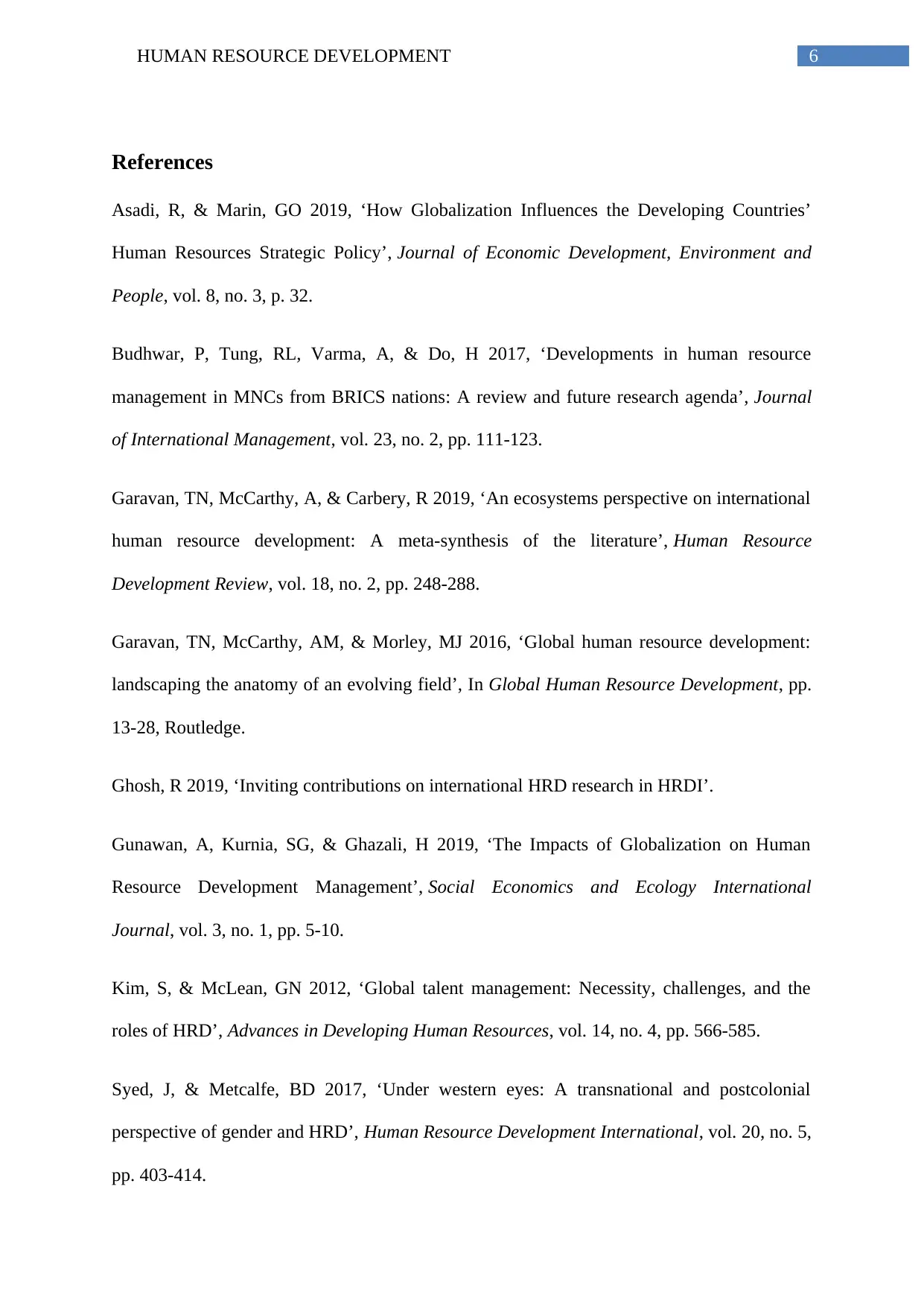
6HUMAN RESOURCE DEVELOPMENT
References
Asadi, R, & Marin, GO 2019, ‘How Globalization Influences the Developing Countries’
Human Resources Strategic Policy’, Journal of Economic Development, Environment and
People, vol. 8, no. 3, p. 32.
Budhwar, P, Tung, RL, Varma, A, & Do, H 2017, ‘Developments in human resource
management in MNCs from BRICS nations: A review and future research agenda’, Journal
of International Management, vol. 23, no. 2, pp. 111-123.
Garavan, TN, McCarthy, A, & Carbery, R 2019, ‘An ecosystems perspective on international
human resource development: A meta-synthesis of the literature’, Human Resource
Development Review, vol. 18, no. 2, pp. 248-288.
Garavan, TN, McCarthy, AM, & Morley, MJ 2016, ‘Global human resource development:
landscaping the anatomy of an evolving field’, In Global Human Resource Development, pp.
13-28, Routledge.
Ghosh, R 2019, ‘Inviting contributions on international HRD research in HRDI’.
Gunawan, A, Kurnia, SG, & Ghazali, H 2019, ‘The Impacts of Globalization on Human
Resource Development Management’, Social Economics and Ecology International
Journal, vol. 3, no. 1, pp. 5-10.
Kim, S, & McLean, GN 2012, ‘Global talent management: Necessity, challenges, and the
roles of HRD’, Advances in Developing Human Resources, vol. 14, no. 4, pp. 566-585.
Syed, J, & Metcalfe, BD 2017, ‘Under western eyes: A transnational and postcolonial
perspective of gender and HRD’, Human Resource Development International, vol. 20, no. 5,
pp. 403-414.
References
Asadi, R, & Marin, GO 2019, ‘How Globalization Influences the Developing Countries’
Human Resources Strategic Policy’, Journal of Economic Development, Environment and
People, vol. 8, no. 3, p. 32.
Budhwar, P, Tung, RL, Varma, A, & Do, H 2017, ‘Developments in human resource
management in MNCs from BRICS nations: A review and future research agenda’, Journal
of International Management, vol. 23, no. 2, pp. 111-123.
Garavan, TN, McCarthy, A, & Carbery, R 2019, ‘An ecosystems perspective on international
human resource development: A meta-synthesis of the literature’, Human Resource
Development Review, vol. 18, no. 2, pp. 248-288.
Garavan, TN, McCarthy, AM, & Morley, MJ 2016, ‘Global human resource development:
landscaping the anatomy of an evolving field’, In Global Human Resource Development, pp.
13-28, Routledge.
Ghosh, R 2019, ‘Inviting contributions on international HRD research in HRDI’.
Gunawan, A, Kurnia, SG, & Ghazali, H 2019, ‘The Impacts of Globalization on Human
Resource Development Management’, Social Economics and Ecology International
Journal, vol. 3, no. 1, pp. 5-10.
Kim, S, & McLean, GN 2012, ‘Global talent management: Necessity, challenges, and the
roles of HRD’, Advances in Developing Human Resources, vol. 14, no. 4, pp. 566-585.
Syed, J, & Metcalfe, BD 2017, ‘Under western eyes: A transnational and postcolonial
perspective of gender and HRD’, Human Resource Development International, vol. 20, no. 5,
pp. 403-414.
Paraphrase This Document
Need a fresh take? Get an instant paraphrase of this document with our AI Paraphraser
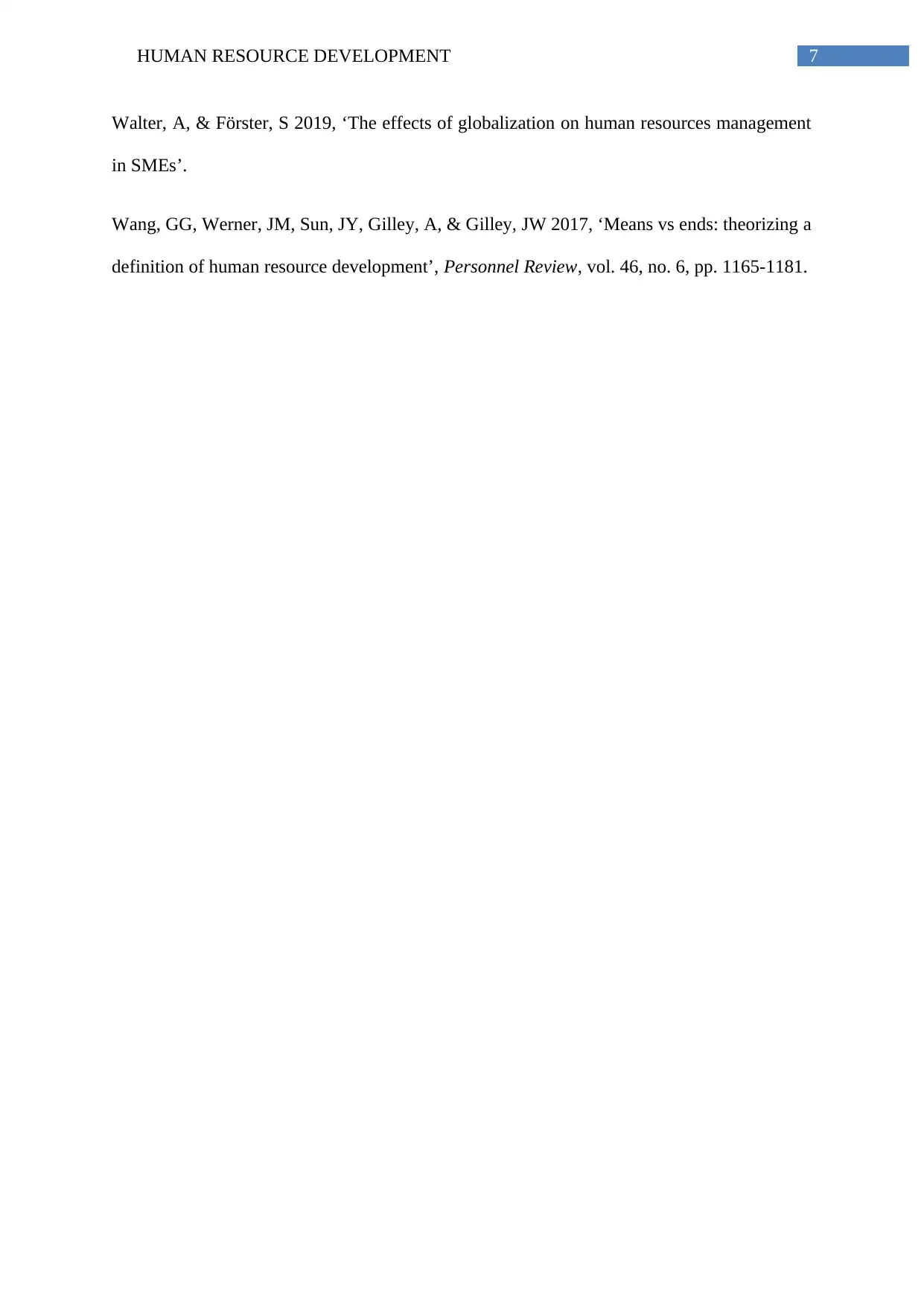
7HUMAN RESOURCE DEVELOPMENT
Walter, A, & Förster, S 2019, ‘The effects of globalization on human resources management
in SMEs’.
Wang, GG, Werner, JM, Sun, JY, Gilley, A, & Gilley, JW 2017, ‘Means vs ends: theorizing a
definition of human resource development’, Personnel Review, vol. 46, no. 6, pp. 1165-1181.
Walter, A, & Förster, S 2019, ‘The effects of globalization on human resources management
in SMEs’.
Wang, GG, Werner, JM, Sun, JY, Gilley, A, & Gilley, JW 2017, ‘Means vs ends: theorizing a
definition of human resource development’, Personnel Review, vol. 46, no. 6, pp. 1165-1181.
1 out of 8
Related Documents
Your All-in-One AI-Powered Toolkit for Academic Success.
+13062052269
info@desklib.com
Available 24*7 on WhatsApp / Email
![[object Object]](/_next/static/media/star-bottom.7253800d.svg)
Unlock your academic potential
Copyright © 2020–2026 A2Z Services. All Rights Reserved. Developed and managed by ZUCOL.





